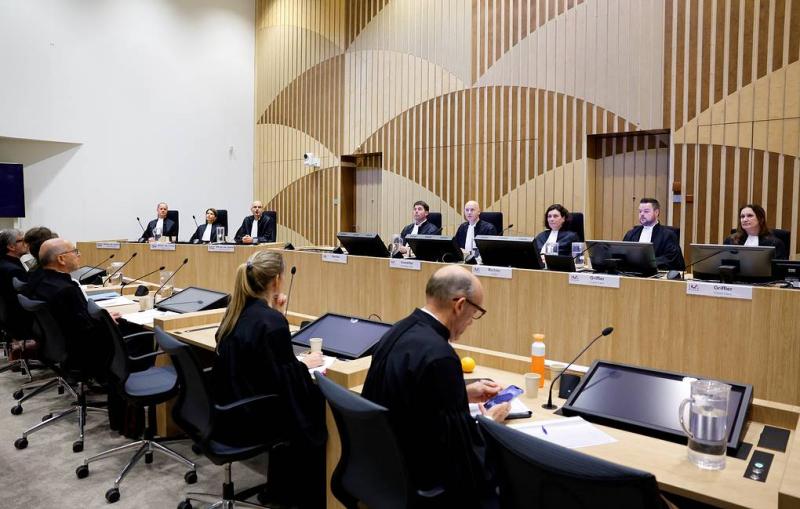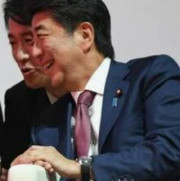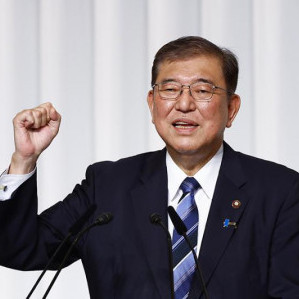
© REUTERS/Piroschka van de Wouw/TASS
Top stories from the Russian press on Friday, November 18th, prepared by TASS
Izvestia: Russia views court ruling on MH17 as politically motivated
Eight years after the tragedy of flight MH17 above Donbass, the Hague District Court ruled that the civilian Boeing 777 was taken for a military jet and shot down by a Buk air defense system missile from the vicinity of Pervomaysky in Donbass which was controlled by the Donetsk People’s Republic (DPR) at the time. According to the judges, the case of MH17 involves a non-international military conflict in Ukraine. Also, the court concluded that the DPR was controlled by Russian officials when the crash happened.
The Russian Foreign Ministry regretted that both the probe itself and the conclusion showed that the case was politically orchestrated. Moscow’s foreign policy agency lamented that the court had only stuck to the version backed by the Hague and its allies and the international team of investigators who insisted on Russia’s involvement in the tragedy. According to Russia’s MFA, the verdict is biased, because, among other things, the court in the Hague also ignored the fact that the conclusion made by Dutch prosecutors was based on testimonies from anonymous witnesses and data of a dubious origin from Ukraine’s Security Service, which is an interested party.
In an interview with Izvestia, Sergey Alexeyev from the Association of Lawyers of Russia said it would be reckless to describe the verdict as objective, because the investigators had considered one version only with the defendants in absentia, defying the principles of cross-examination and the right to defense counsel. "So, this is a politically biased decision that was made in light of the geopolitical confrontation on the international arena," he said.
Karine Bechet-Golovko, a doctor of public law and a guest professor at Moscow State University, argued that the ruling would not have any consequences for Russia under the current circumstances. According to her, the fact that Russia was not allowed to take part in the investigation on time is evidence that the goal of the process was to prove Russia’s guilt. And though the verdict announced on November 17 is allegedly judicial, it can have political results only, she told Izvestia. "Still, this is not a big deal anyway. A year ago, it could have posed some political dangers to Russia, but now it doesn’t matter at all," Bechet-Golovko concluded.
Media: What the grain deal’s extension means for Russian exporters
On Thursday, the Russian Foreign Ministry announced that the grain deal between Russia, Ukraine, Turkey and the United Nations would be automatically extended for another 120 days, since there were no objections to that. This information was confirmed by the presidents of Turkey and Ukraine and the UN chief.
Director-General of the UN Conference on Trade and Development Rebeca Grynspan said the problem of fertilizers would have to be solved next. However, Russian suppliers cannot see any positive effect from the grain initiative yet, because the UN has not fulfilled its commitments, President of the Russian Grain Union Arkady Zlochevsky told Izvestia. The agreement spells "nothing but damage" for Russian companies, Zlochevsky lamented, for restrictions on Russian grain exports were never lifted. Amid the existing unofficial sanctions, Russian exporters are forced to sell their wheat with a substantial discount to their rivals - $30 per metric ton, he said.
Yunus Emre Kanat, president of Turkish think-tank SAGEDER, told Izvestia that the West would hardly agree to lift their restrictions amid lobbying from Ukraine who could block any discussion on lifting the sanctions at the EU. Another Turkish analyst, Kerim Has, said Russia could use Turkey as a hub for its grain and fertilizer exports, if the UN fails to nix the sanctions on Russian wheat. He also said Ankara could now act as a mediator during negotiations to remove food from the ongoing sanctions or their consequences, the expert concluded.
Chairman of the Union’s Board of Directors Eduard Zernin told Kommersant that the grain initiative was neither good nor bad for Russian companies, which is okay given the situation. And it certainly helped Russian exporters change their approach to communication with key consumers and stabilize or even increase some export volumes, Zernin said.
Meanwhile, the issue of fertilizers is more than serious. About 2 million metric tons of ammonia produced by TogliattiAzot was pumped through the Togliatti-Odessa pipeline annually, and sources told Kommersant that the latest text of the grain agreement never included the provisions for resuming ammonia exports via the port of Odessa. Nor did sources confirm to the newspaper that the seizure of 300,000 metric tons of Russian fertilizers in European ports had been lifted. According to Kommersant, Russian chemicals have so far been unblocked in Belgium alone, while the Baltic nations strongly oppose the unblocking of Russian fertilizer exports.
Vedomosti: GOP retakes House of Representatives
On Thursday, the Republicans gained the necessary 218 seats to secure a majority in the House, according to forecasts reported by CNN and NBC. According to NBC, the GOP now has 221 out of 435 seats, and the Democrats who earlier kept control of the Senate so far get 214 seats. US President Joe Biden congratulated the Republicans on their House win and said he was ready to work with them.
Michal McCaul who will most likely chair the House’s Foreign Affairs Committee said the Republicans intended to use their lead for stricter control of how funds sent to Ukraine are used. McCaul said the House was not planning to cancel its support for Ukraine, as this, he said, was how the US is trying to avoid a global conflict. And there are currently signals in the United States indicating that the Republican victory would bring countering China to the fore. For example, McCaul stressed that competition with China and control over the export of hi-tech products to the Asian giant was his priority.
Head of the Center for North American Studies at IMEMO RAS Victoria Zhuravleva told Vedomosti that Washington could soon have a lesser focus on Ukraine, even though its support for the country would remain the same. According to her, the Senate will have a final say on the matter, while the House could conduct reviews of the spending of the allocations for Ukraine. "Therefore, the Republicans can only slow down the process, rather than change the general course," the expert added. And she agrees that next year, both parties and the Biden administration will try to shift the focus to China.
Against the background of anti-Russian rhetoric, which is dominant in both parties, no radical changes in the key decision making on Ukraine should be expected, adviser to the director of the Russian Institute for Strategic Studies Ilya Kravchenko told the newspaper. He said China and Ukraine were parallel topics in the US foreign policy, and there was bipartisan consensus on both. Meanwhile, the House may change its tactics now that the GOP has the majority, and there could be more anti-Chinese resolutions, but the general strategy is unlikely to change, the expert reiterated.
Kommersant: Russia pumping more oil ahead of EU embargo
Russian oil companies have been pumping more oil with less than three weeks to go before the EU’s oil embargo comes into force. According to Kommersant, by mid-November the industry had pumped 1.48 million metric tons per day and is also increasing oil refining volumes.
On December 5, the European embargo on Russian oil will go into effect that will also bar European insurers from servicing tankers for Russian oil exports to third countries. Currently, China is the largest buyer of Russian oil, and India is rapidly catching up. In October, it accounted for about 40% of Russian maritime oil shipments. Reuters reported on Thursday that not all Indian companies would be ready to buy Russian crude after December 5. The news agency also expects Chinese refineries to buy less Russian oil, too. This could further push down shipments by tankers in the second half of November.
Pushing up oil production to a near maximum could have something to do with uncertainty, Maxim Malkov from Kept told Kommersant. According to him, in anticipation of the coming restrictions on Russian oil, consumers are trying to maximize their reserves. And Russia is seeking to redirect its seaborne oil exports from the West to the East, where China and India account for the bulk of the increase, he added. The volume of Russian oil exports could drop in December when the restrictions are enacted, the expert warned, and the country’s oil production could decrease by 7% in 2023.
Sergey Kondratyev from the Institute for Energy and Finance Foundation told Kommersant that crude production volumes could drop 3-5% in December over the ban on seaborne Russian crude imports. He also cited data from Platts showing that the spreads between the UAE’s Dubai blend and ESPO, and those between Urals and Brent have not widened yet, which means that Russian crude is not cheaper than its rivals, and therefore offers no incentive for Asian consumers to increase their purchases so far.
Izvestia: Viktor Bout shares his hopes and fears
Russian businessman Viktor Bout who is doing time in the US on charges of arms trading, is placing his hopes on dialogue between Moscow and Washington on a prisoner swap. In an interview with Izvestia taken with assistance from his wife, Bout said: "I cannot say how soon I could return to Russia. But certainly I am pleased and encouraged by two facts - that there already was such an exchange and that there was dialogue between the two presidents." Bout referred to the exchange of Konstantin Yaroshenko for US citizen Trevor Reed in late April. However, Bout said he feared the talk about a potential exchange could turn out to be just talk.
Nobody has been visiting him in prison in the US, Bout lamented. "Since 2020, I have been visited twice - by the consul and - a few weeks ago - by US Ambassador to Russia Anatoly Antonov," the Russian national said.
Unfortunately, he has no information about the current developments in Russia. "I have not been getting any newspapers over the past month and a half due to a technical glitch. Only a publishing house or some other legal entity may send in newspapers, but I was allegedly subscribed by an individual, so the prison said they would not give me any news material yet. <…> The embassy promised to resolve the problem soon," he said.









